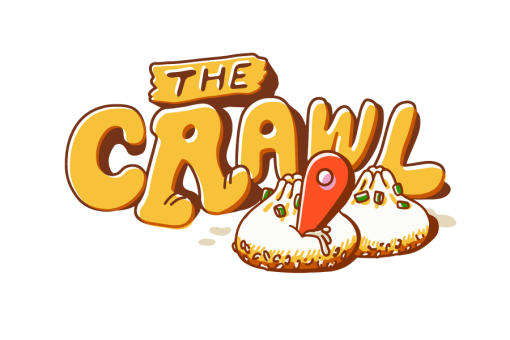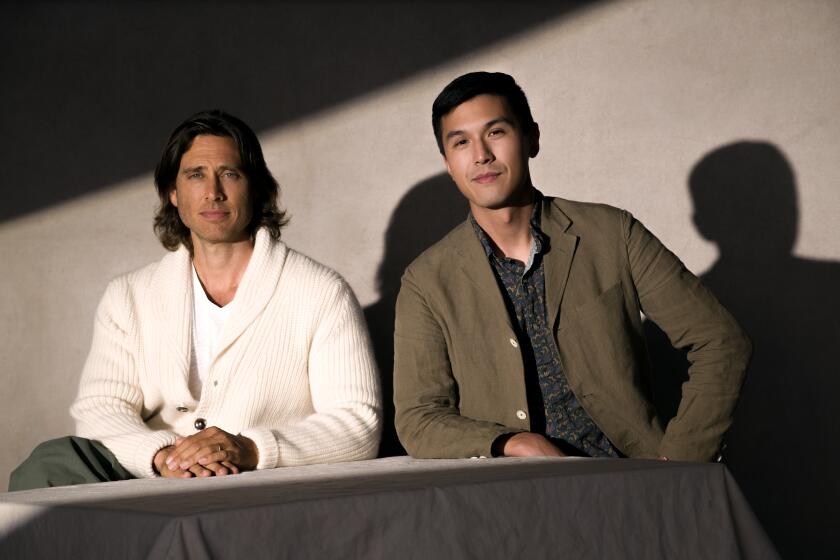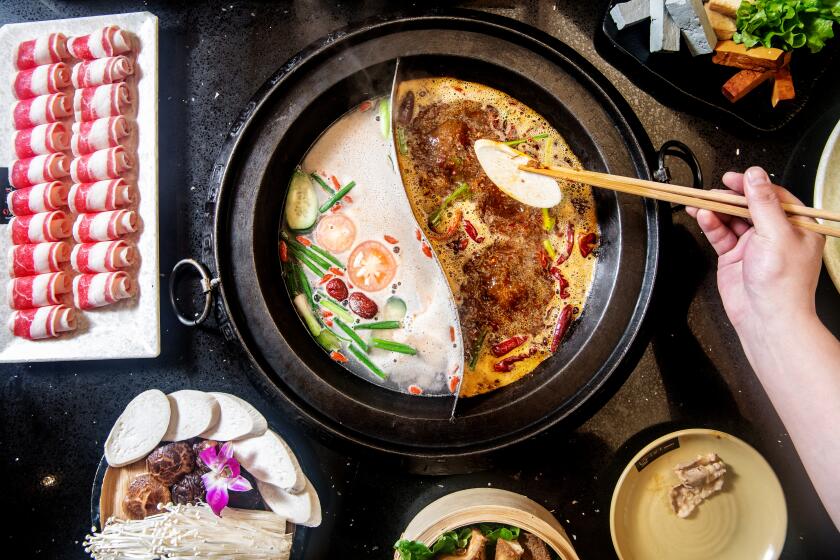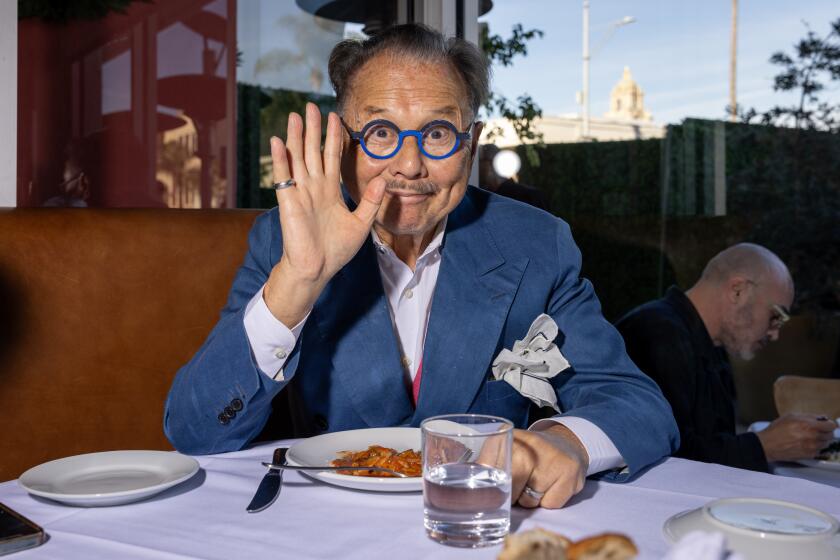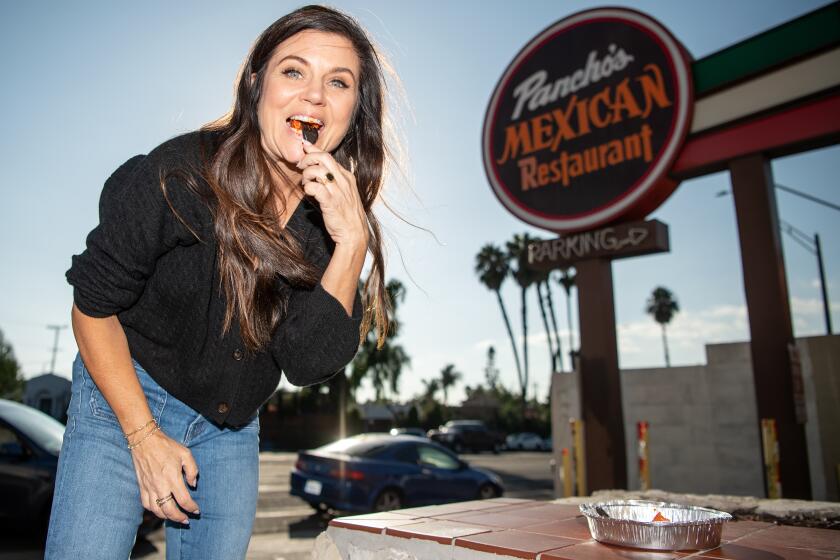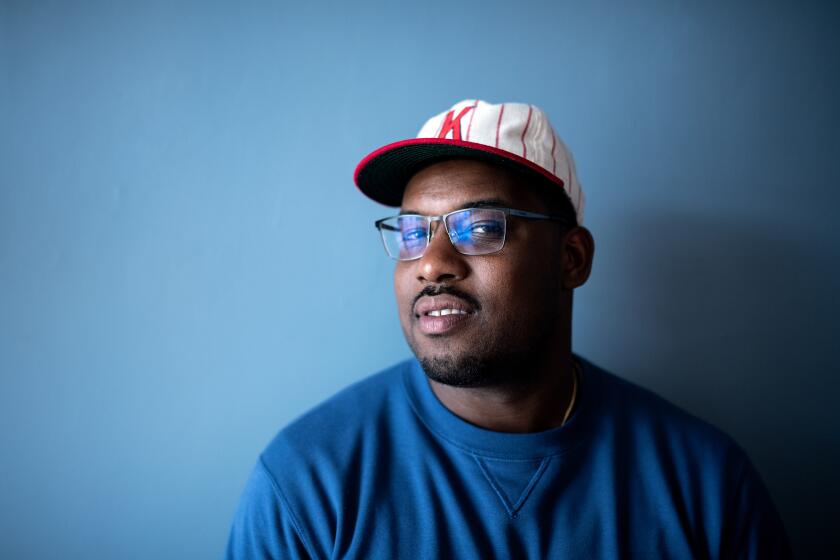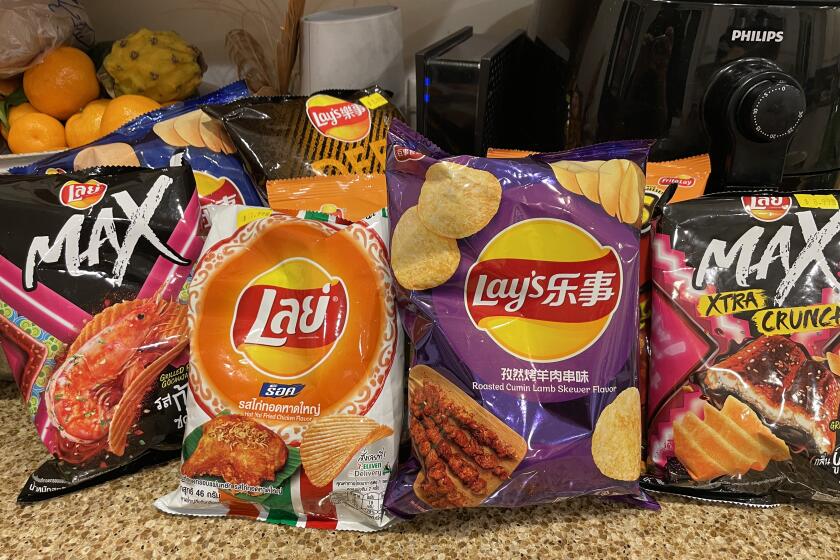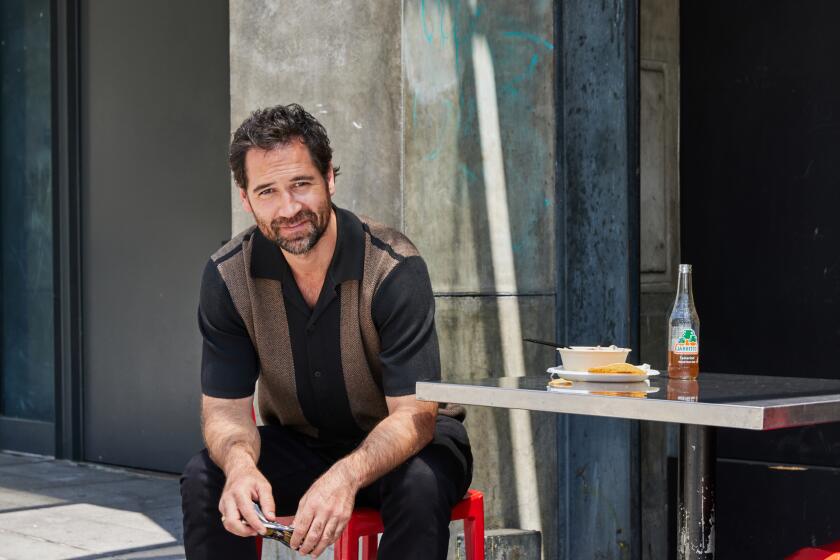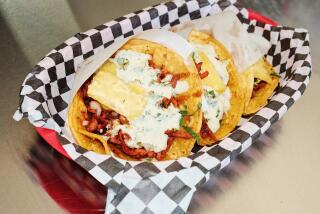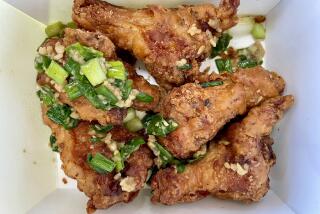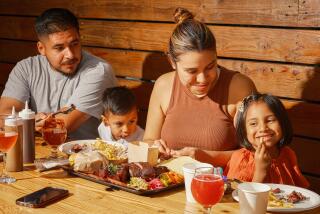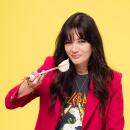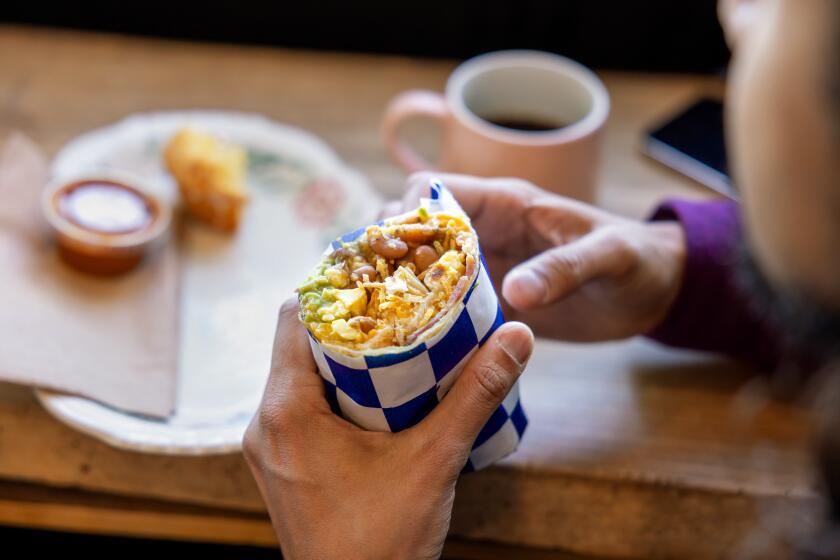Ongoing Series
Columnist Jenn Harris joins your favorite celebrities to explore their go-to cuisines and restaurants in Los Angeles.
Jidori Chicken, if you’re reading this, Justin Chien is a fan. A big one.
Chien, who plays a Taiwanese triad pistoriophile in the Netflix series “The Brothers Sun,” buys what he estimates is 40 to 50 pounds of the L.A.-based chicken processor’s California free-range birds each time he places an order.
“When I have time, I’m cooking four or five days a week,” he says. He’s sitting behind a wall of steam at Xiaolongkan, a hot pot restaurant in Alhambra, with a large bubbling vat of broth in front of him. Next to him is “The Brothers Sun” co-creator and writer Byron Wu.
“Mostly I cook chicken and rice, and I will say that my chicken is very good,” he says. “I’m on the Jidori VIP list.” He swipes through his phone and proudly shares an old email from Jidori, informing him that he’s on the VIP list and that he has special access to Black Friday deals. “Like, dude, I made it.”
Family drama and brutal fight scenes get equal footing in ‘The Brothers Sun’: ‘It’s a balancing act’
Byron Wu and Brad Falchuk’s Netflix comedy “The Brothers Sun” veers from action to family drama to comedy and back again, and they say that though it’s violent, it’s “supposed to be fun.”
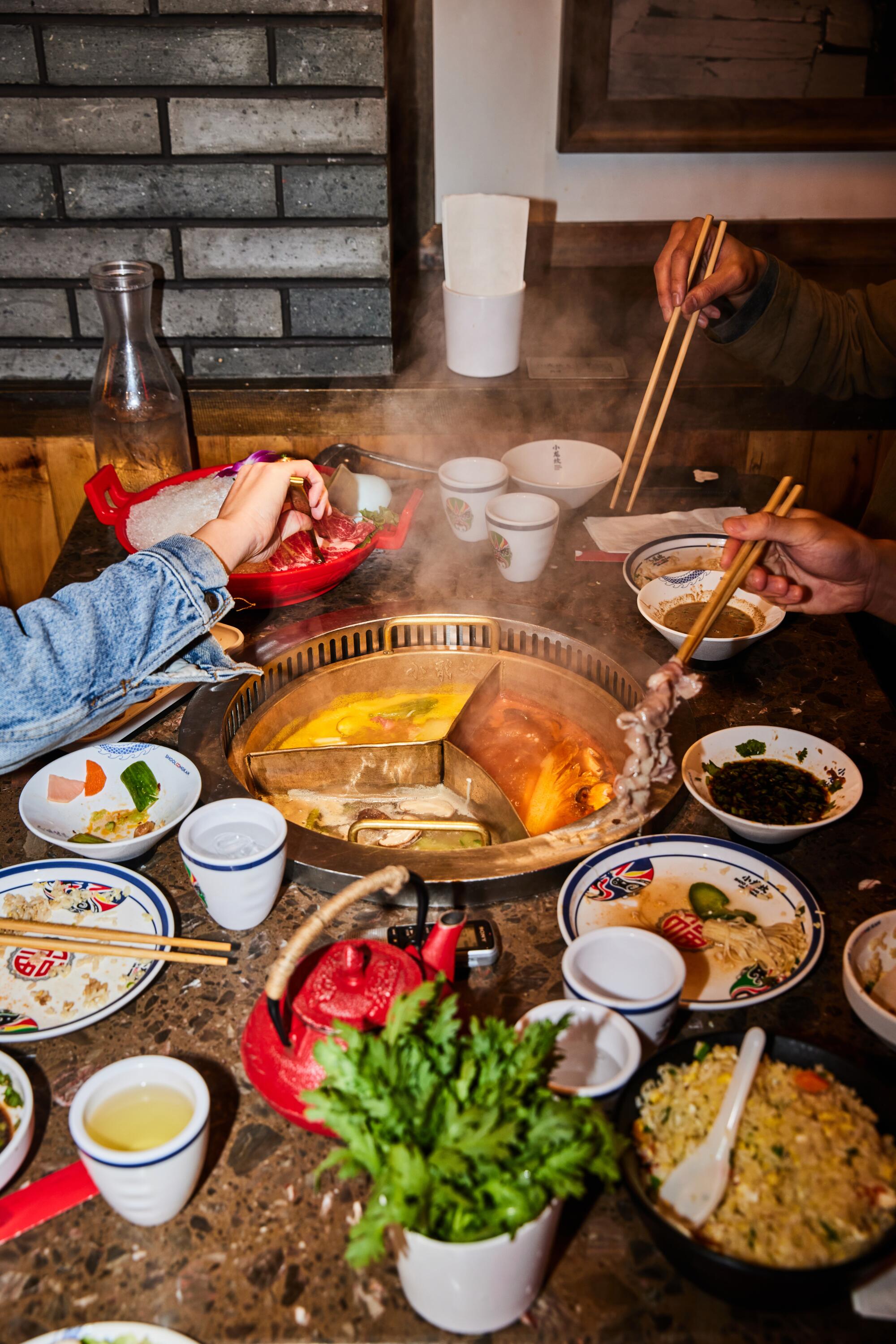
1:01 p.m. Xiaolongkan hot pot
Wu and Chien are spending the afternoon in the San Gabriel Valley, highlighting some of the memorable locations and foods featured in the series. It’s a show that centers around brothers Charles (Chien) and Bruce Sun (played by Sam Song Li). Their father (Johnny Kou) is the head of a triad, and their mother is played by Michelle Yeoh. I promise to keep the spoilers to a minimum, but it’s funny and smart, with fight scenes that will leave you breathless. And it made me feel seen as an Asian American. It’s the best show Netflix isn’t renewing.
The hot pot restaurant in the third episode that looks more like a palace with its ornate woodwork, red and gold light fixtures and pristine marble tables? It’s Xiaolongkan.
“Do we want to be sweating a bit?” asks Wu.
The two decide they do not want to be sweating and forgo the spicy broth for tomato, golden and beef bone broths. While they wait for their food to arrive, they visit the condiment bar, outfitted with dozens of sauces and garnishes, in the center of the room.
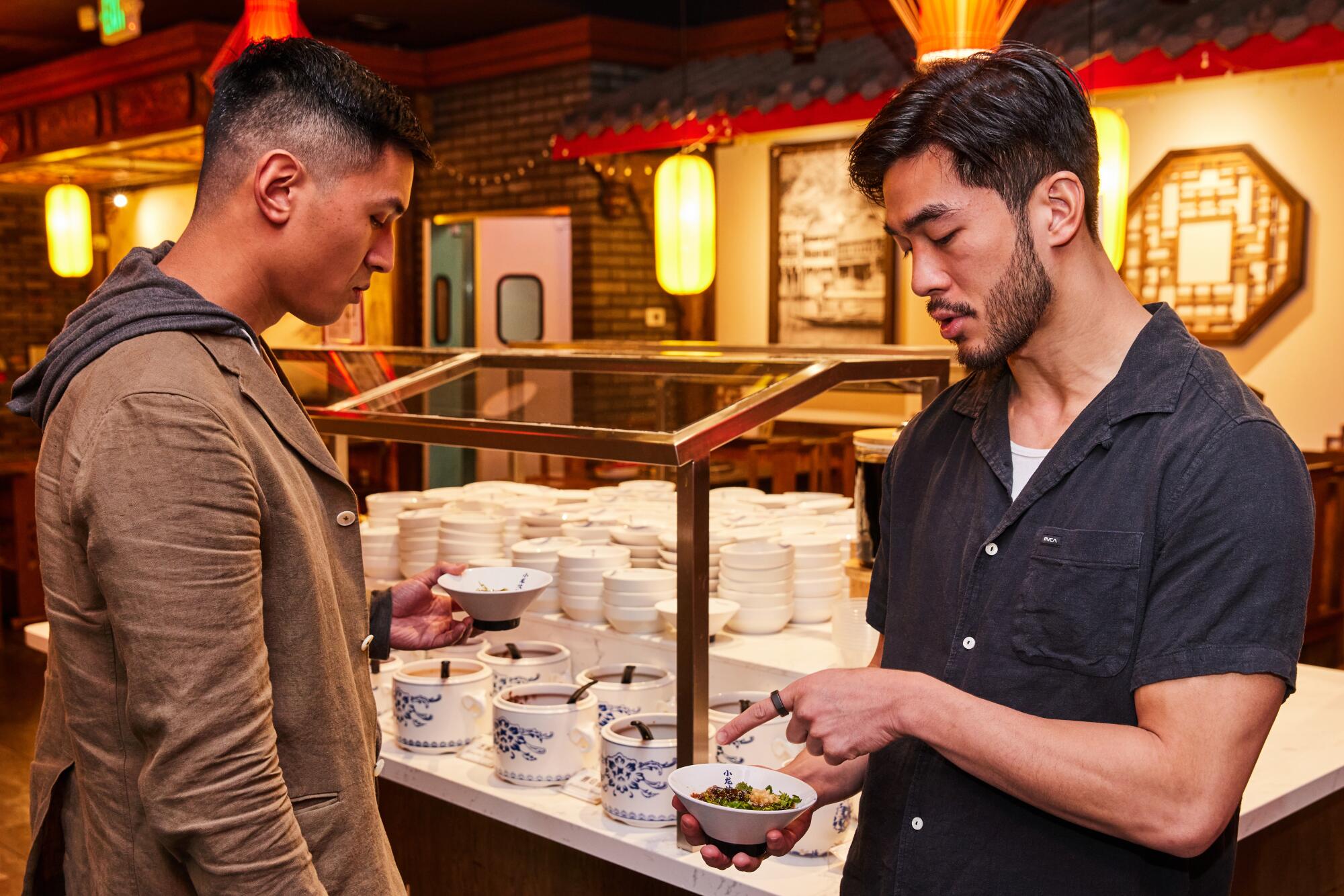
“This is a very typical part of any hot pot experience,” Chien says, grabbing a small bowl.
He proceeds to fill the bowl with green onion, cilantro, crushed raw garlic, the house special sauce (a soy-based sauce with lemon), a mushroom sauce with bits of chopped mushrooms, chive sauce, oyster sauce and soy sauce.
Wu fills his bowl with sesame paste, fermented red bean curd, some green onion, cilantro, garlic and sugar.
From Japanese shabu shabu to Thai jim joom to fiery Chinese hot pot, Los Angeles has a world of hot pot to choose from.
The food is presented on an elaborate cart: slivers of raw Wagyu beef splayed over a mound of crushed ice with dry-ice smoke tendrils dramatically swirling across the top; a plate of tightly rolled slices of lamb; napa cabbage and enoki mushrooms. A plate of fried rice. Chien and Wu take turns swishing the meat around in the hot broth, then dunking the slices into their prepared sauces.
“We wanted the food to not just be something that’s shown onscreen,” Wu says. “Hot pot is something that’s really meaningful to me, and it’s something I grew up eating a lot of at home.”
Wu, who is originally from Seattle, lived for a time in Hacienda Heights, a city in east San Gabriel Valley.
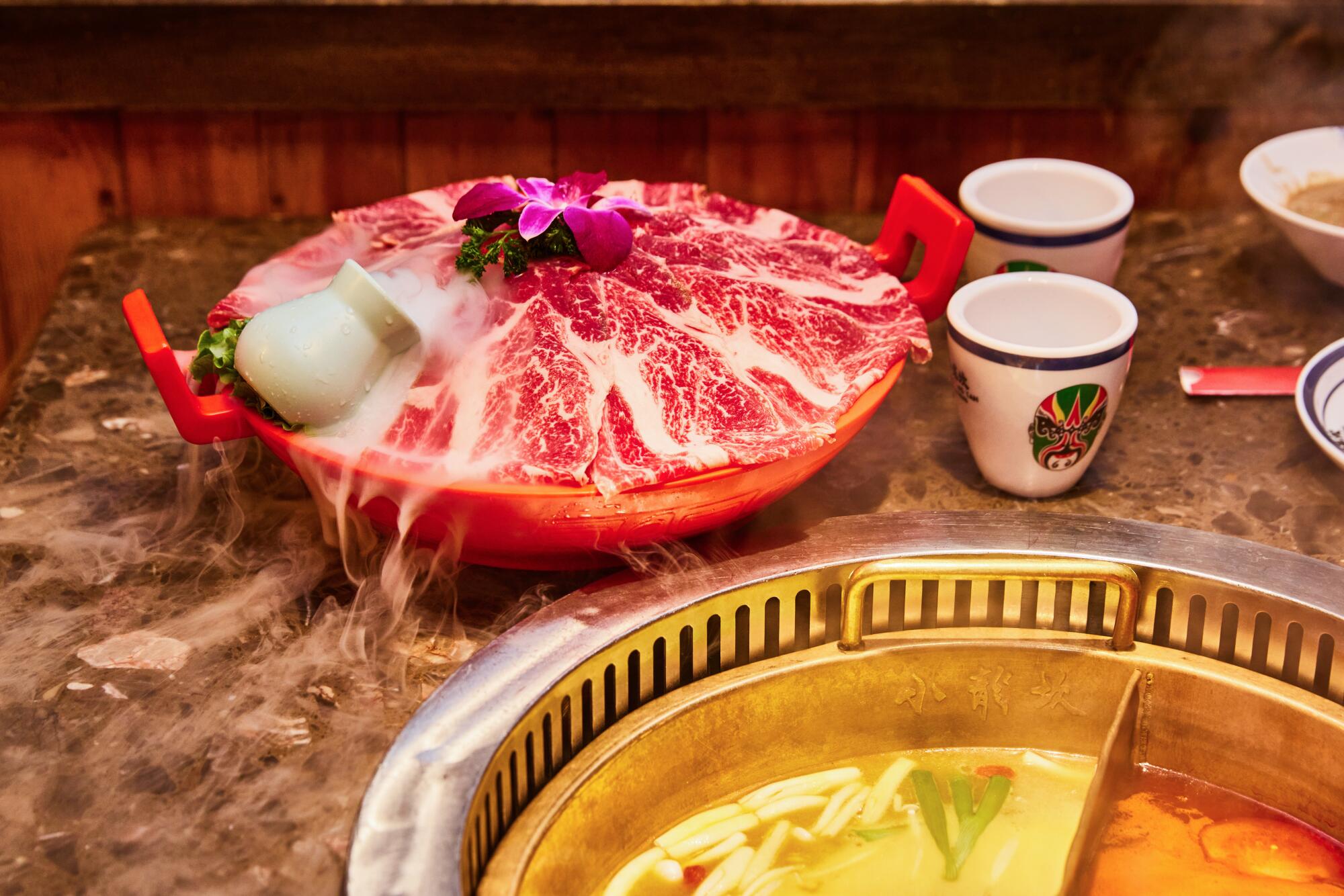
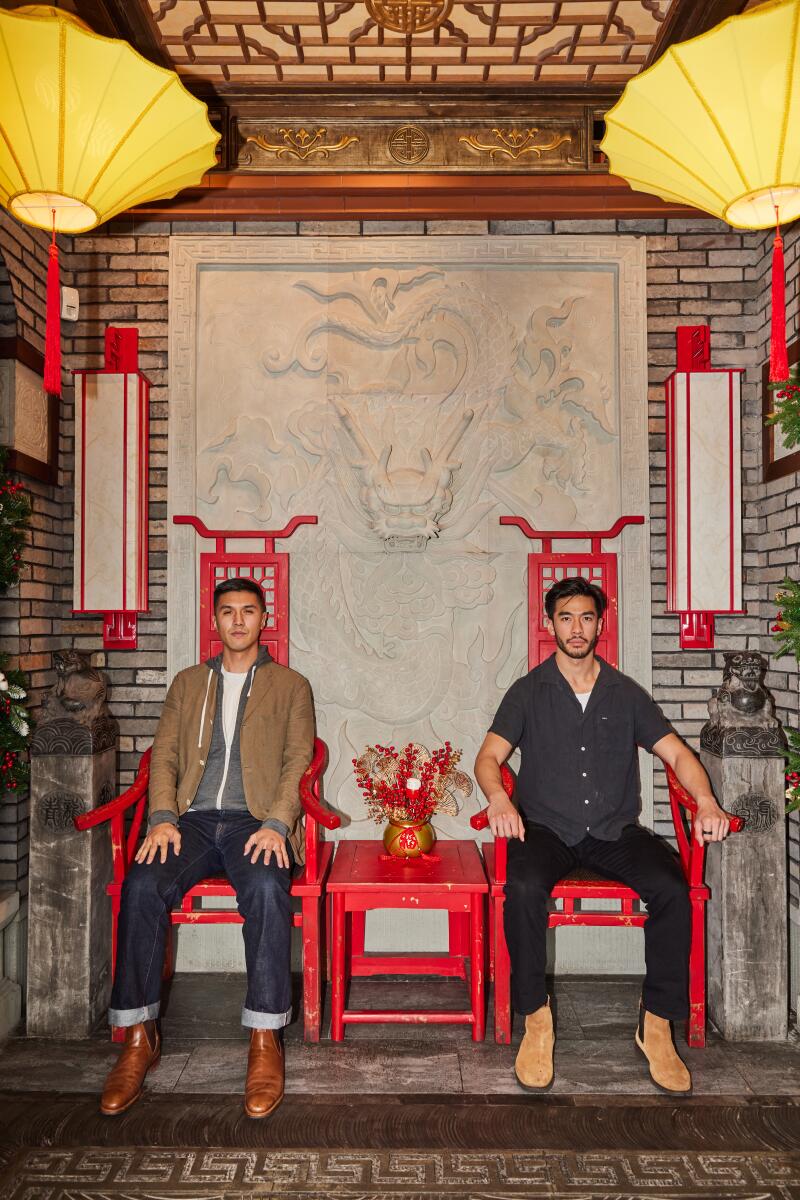
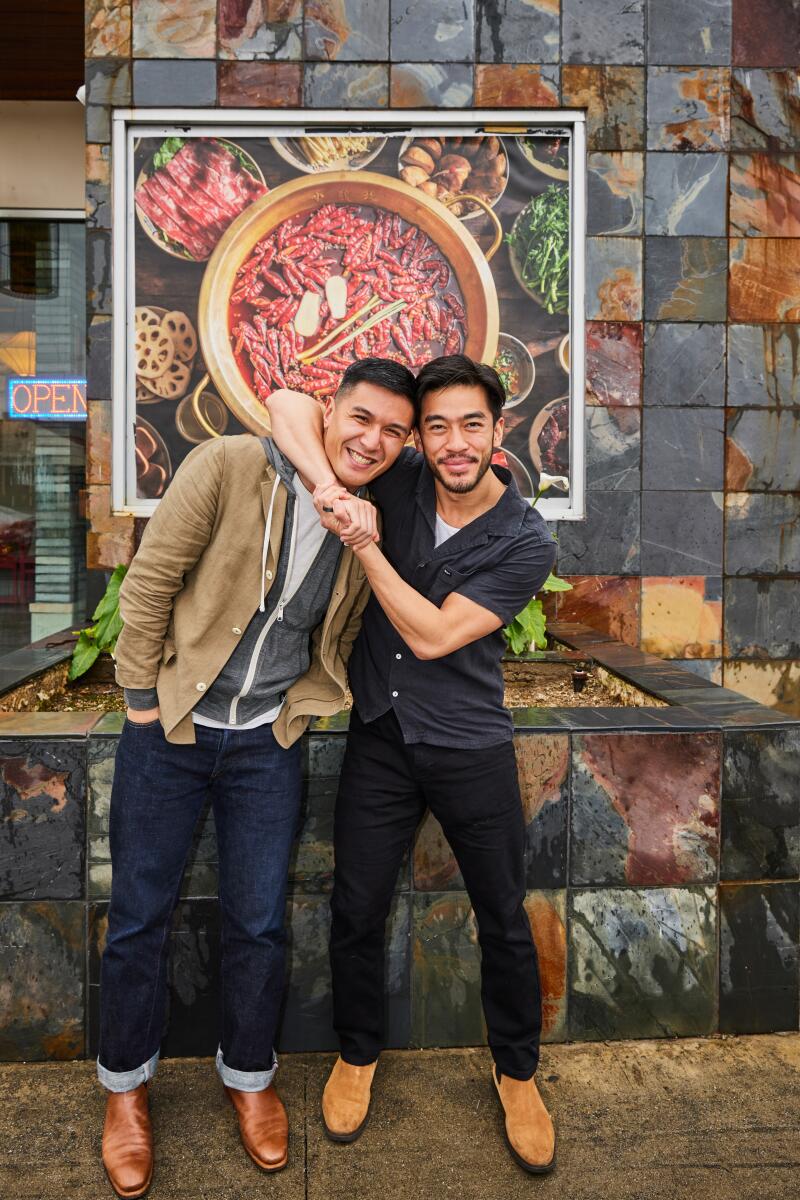
Writer Byron Wu, left, and actor Justin Chien settle in at Xiaolongkan.
“I had no idea where the SGV was before that,” says Wu. “When ‘Love’ came out, everyone was talking about how amazing it is that they are showing off Echo Park, this cool part of L.A. that nobody really sees. I was like, really? The SGV is such a bigger area that has a huge community, and nobody has ever really filmed here. So when it came to setting the show somewhere, I really wanted it to be the SGV.”
The SGV is almost its own character on the show, the many strip malls providing a backdrop for the series.
“I’ve been to many hot pot places, but this place is definitely up there,” Chien adds. The actor grew up in Taipei and Hong Kong and moved to the United States when he was 18 to attend USC.
“I have really sweet memories of doing hot pot at home,” Chien says. “I’ve made my own stocks before too. If you’re a serious eater, you should be a serious cook.”
Michael Chow, star of the HBO documentary ‘AKA Mr. Chow’ and founder of the Mr. Chow empire, takes us on a food crawl to his favorite L.A. restaurants.
Much like his character in the show, Charles, who enjoys watching “The Great British Baking Show” and is as passionate about baking as he is about his six-pack, Chien likes to cook. And he has serious opinions about food.
“My friends make fun of me because they say I’m a bit of a food snob,” Chien says. “I have an ice cream rating of all the different ice creams I’ve had. But I watched ‘The Menu.’ I don’t want to be that guy.”
His reference to Nicholas Hoult’s food-photo-snapping character in “The Menu” elicits a laugh from Wu. “But you do talk about mouthfeel,” Wu says. “I could feel you trying to avoid it just now.”
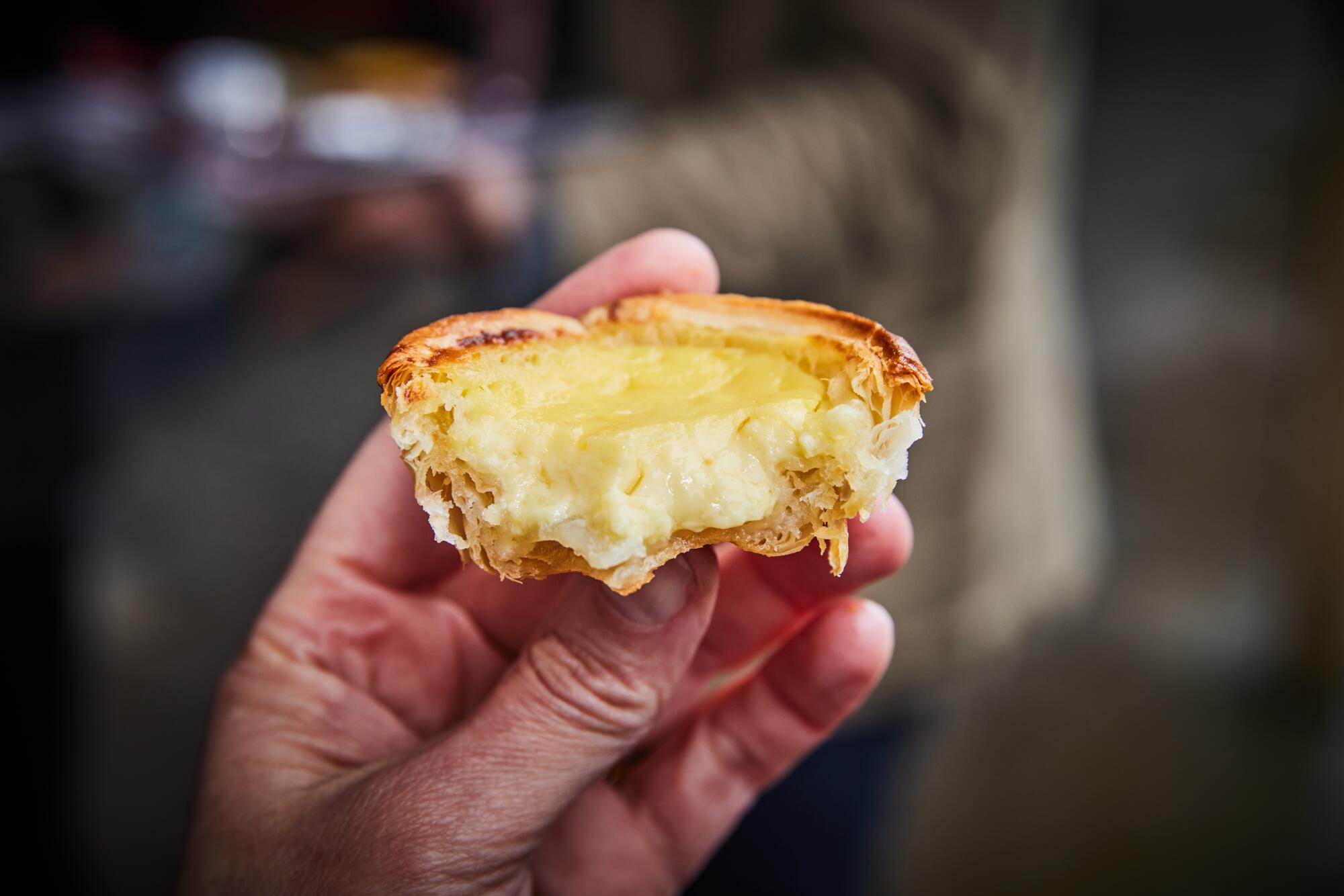
2:14 p.m. Kee Wah Bakery
Chien can’t decide if he should get the hot dog buns. The golden breads with sausage peeking out from both ends sit neatly on a tray inside the Kee Wah Bakery in Monterey Park. He grabs two, both individually wrapped in plastic.
This is where, in the series, Charles Sun buys baked goods to bring to his mother’s home in Episode 1.
“I feel like these bakeries are just such a part of being Asian American,” Wu says. “Where I grew up, there was one down the street and my mom would run in and grab like 30 baked things, each in their own individual plastic wrap.”
“These bakeries are also really familiar for me because they’re all built almost the same way, they smell exactly the same,” Chien says. “For Charles, going into that bakery having just taken a 13-hour flight from Taipei to buy stuff for his mom, it makes sense.”
The woman behind the counter recognizes Chien from the show. She points to a stack of magnets that say “Brother Sun x Kee Wah Bakery.”
“We had stickers,” she says, “but we sold out.”
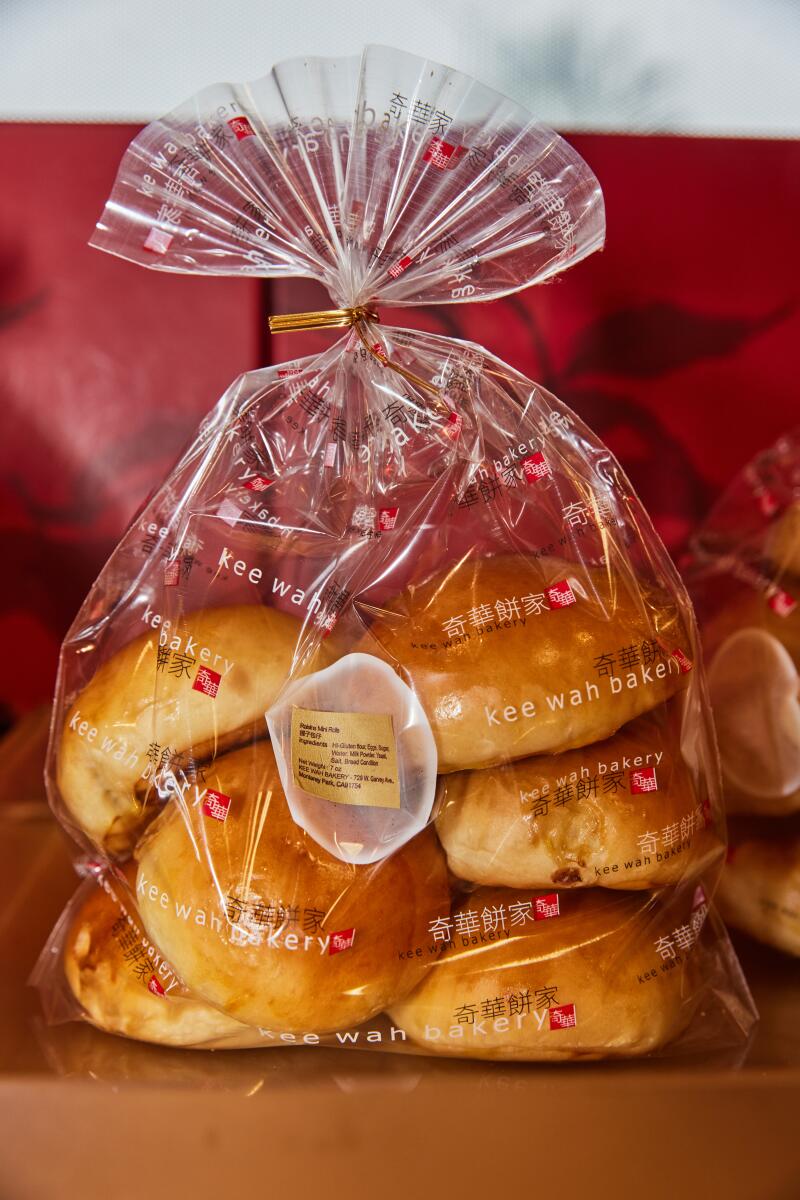
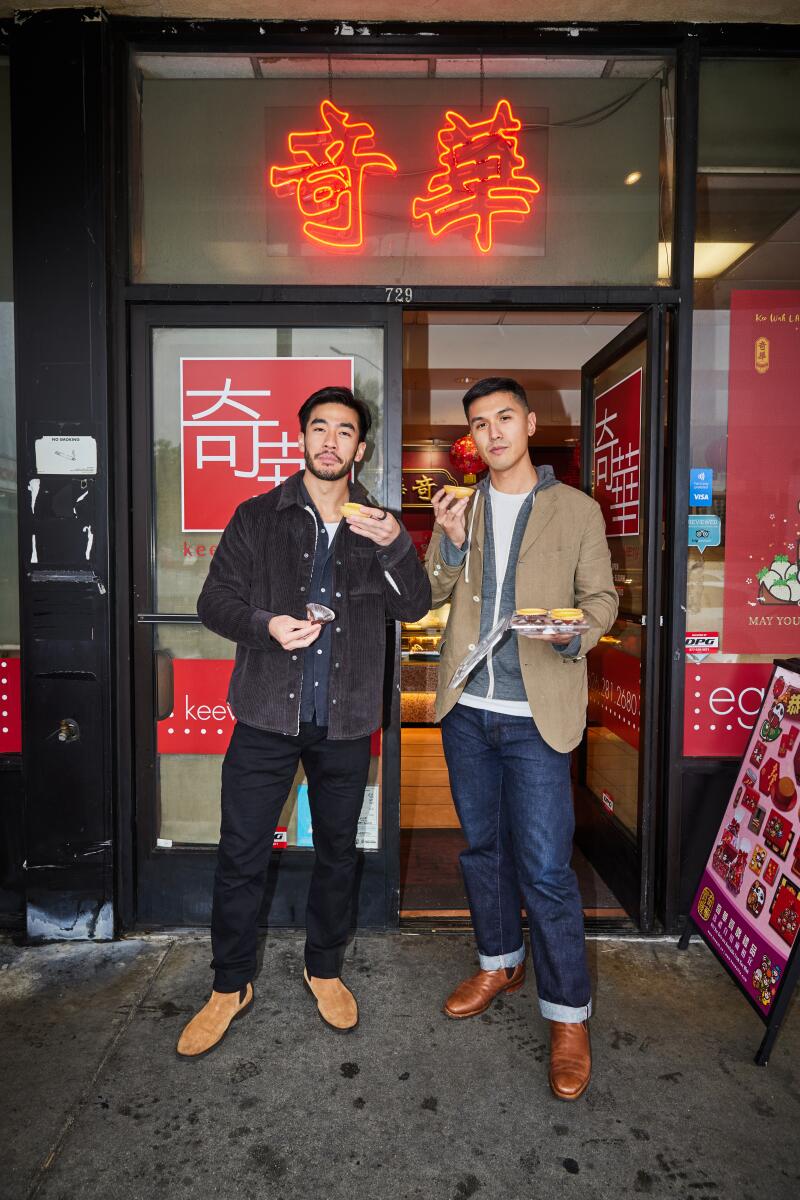
“I feel like these bakeries are just such a part of being Asian American,” says Wu, right.
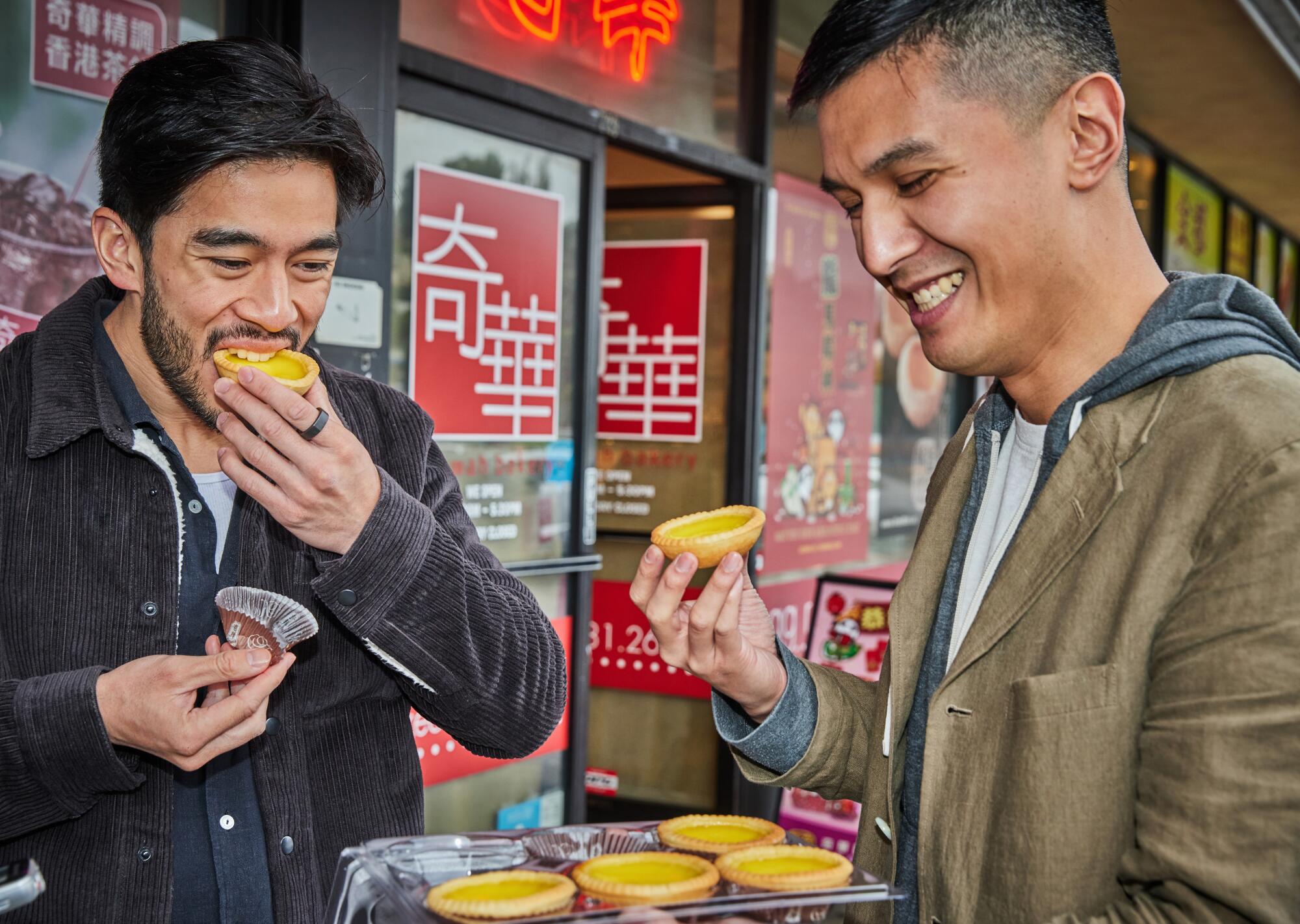
Chien and Wu leave with boxes full of warm dan tat. The bakery makes three styles of the egg tarts, including crispy, original and Portuguese.
Wu declares Portuguese-style tarts his favorite. Chien is Team Hong Kong. They bite into the crispy tarts first, with flaky crusts similar to the Hong Kong-style dan tat you’re likely to find at a dim sum parlor. The crust is so rich and flaky it borders on powdery, ultra buttery and crumbling on contact.
The ‘Saved by the Bell’ icon’s food crawl began with Southern-fried frickles and ended with Michelin chocolate cake. No wonder her new cookbook levels up leftovers.
“It has a really nice eggy aroma,” Chien says, crumbs flying everywhere. “These are my favorite. You get a good proportion of crust to filling. And the crust is seasoned well.”
Next are the original tarts, with the same egg custard filling and a crust like shortbread.
“These are like the kind my great-aunt would make,” Wu says.
They finish the tarts in two bites. They move on to the Portuguese tarts without hesitation, marveling at the caramelized tops.
“It tastes like it’s fried, but it’s not,” Chien says. “It smells more buttery. Oh, I think I like this one better.”
“I told you, dude,” Wu says, his mouth full of dan tat.
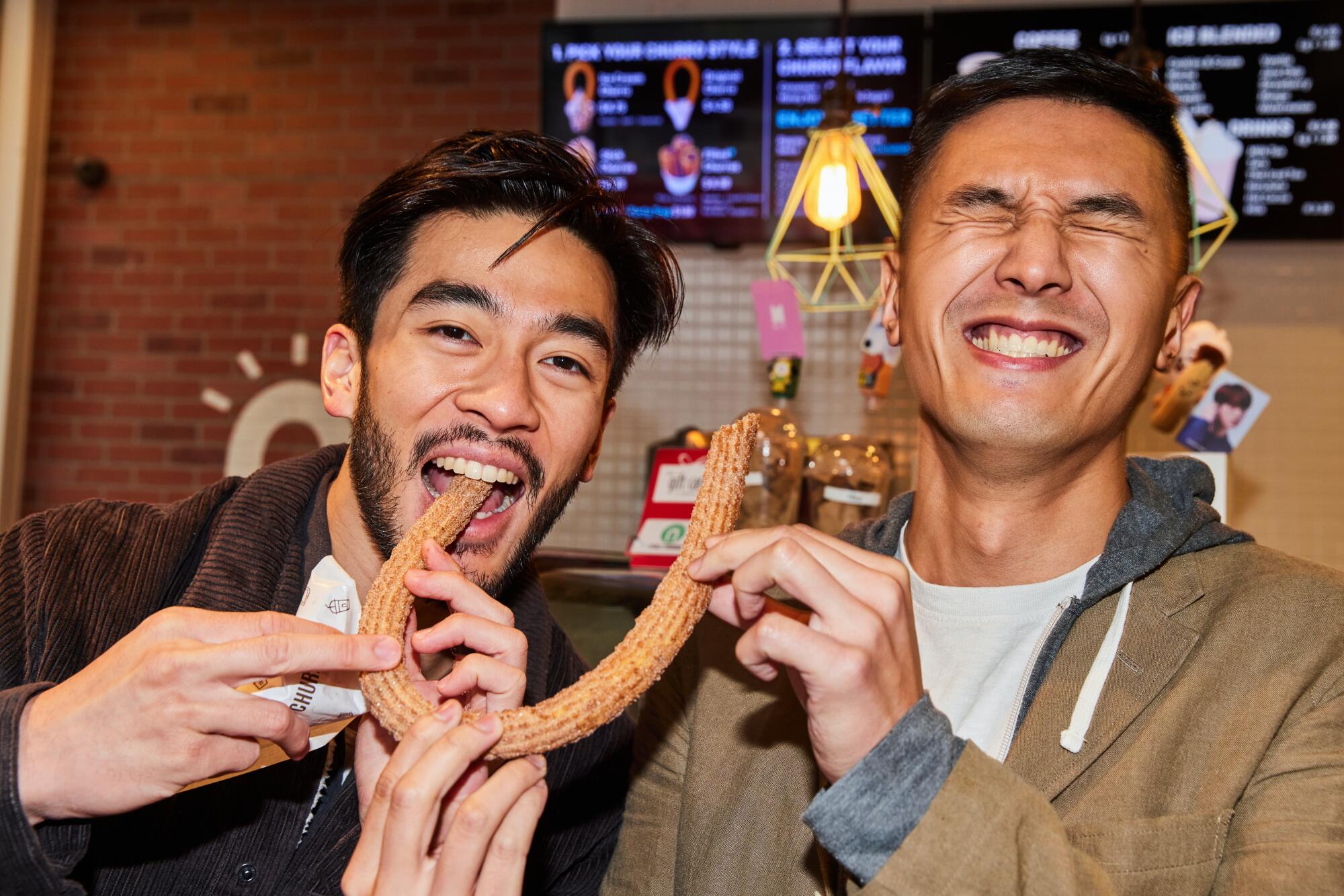
2:53 p.m. Street Churros
Wu leans over the counter at Street Churros, a small cafe in the Atlantic Times Square strip mall, attempting to get a look inside the kitchen.
“I’m trying to see their setup,” he says. “I want to see what extruder they are working with.”
In the series, Charles Sun develops an obsession with churros. It’s a fondness that mimics Wu’s real-life obsession with the churro cart he frequents in Glassell Park.
“We wanted to pick a baked good and a dessert that felt very L.A.,” Wu says. “We felt like it just represented L.A. so well for someone coming from Taiwan, and I really liked how it’s like youtiao, and it made sense that Charles would latch onto it.”
Wu’s binge-watching “The Great British Baking Show” also led to that show being featured in the opening scene of the series.
“I did a lot of prep for this character with stunts and cooking,” Chien says. “Part of my prep was I baked a Japanese cheesecake. I was enjoying the process and I was like, I think that’s the reason why Charles enjoys it so much. It’s one of the few moments in his life where he can be on his own and do something somewhat normal and domestic. The rest of his life is very chaotic and violent.”
‘The Bear’ star Lionel Boyce takes us on a food crawl through Inglewood for breakfast, soul food, doughnuts and chicken wings.
A man behind the counter hands Chien a hot churro in a paper sleeve. It’s shaped like a horseshoe and generously dusted in cinnamon and sugar.
“Should we both eat one end?” Chien asks.
“Like Lady and the Tramp?” says Wu.
They make an attempt, but the churro breaks in half and almost falls to the floor. Chien swoops his arm down at lightning speed for a quick save.
“It’s really good,” Chien says. “Crisp and chewy. I’ve had bad churros. Like sometimes it feels like cardboard. Or the ones where the star pattern is too aggressive.”
“This is right by a movie theater,” Wu says. “You can sneak them in! That’s what pockets are for. Churros.”
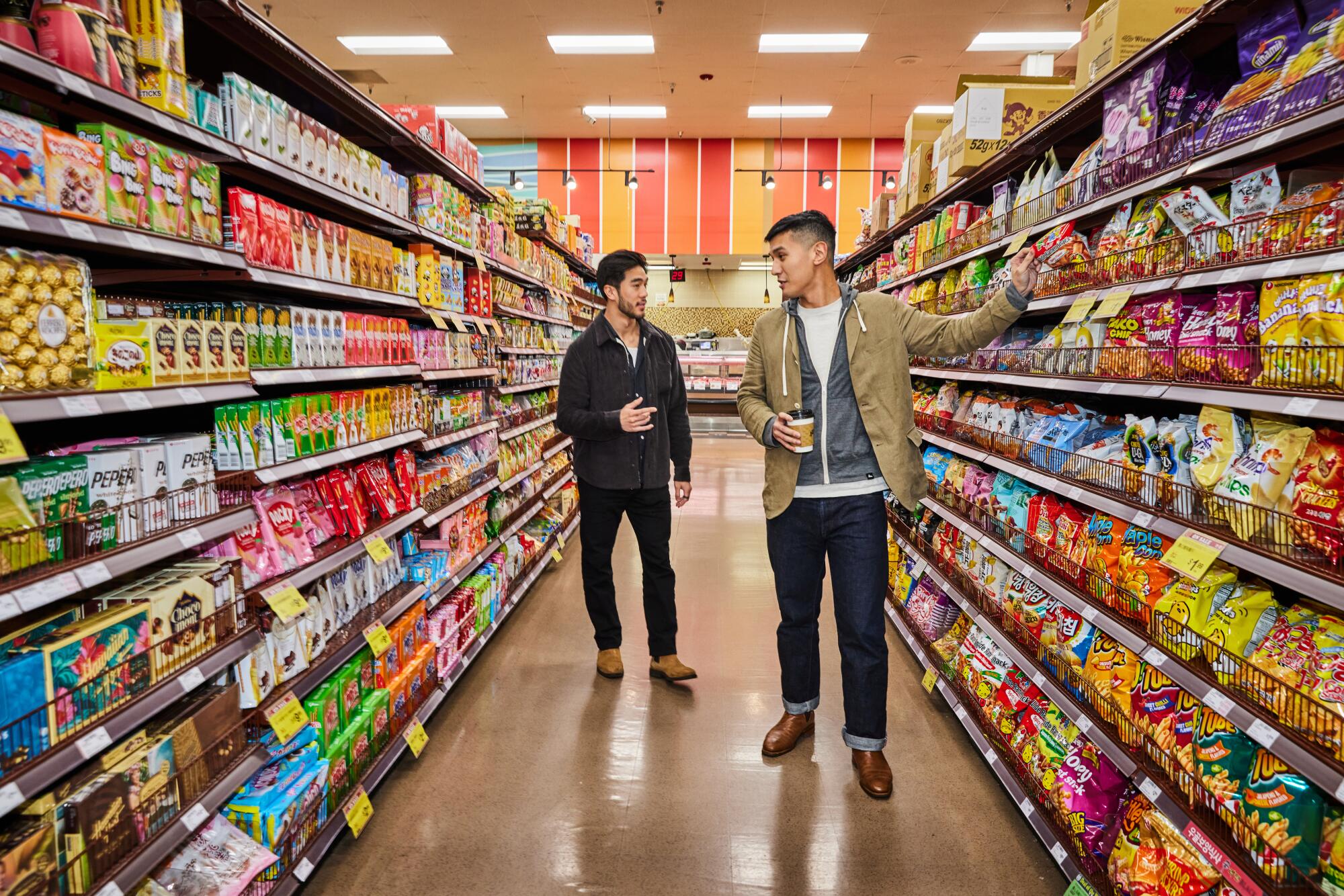
3:19 p.m. 99 Ranch Market
Though no scenes are actually filmed at a 99 Ranch Market, plastic bags emblazoned with the logo make an appearance on the show when a character brings home food from a grocery store. The market, a wonderland of Asian ingredients, seafood and produce, is synonymous with the San Gabriel Valley and Asian American neighborhoods around the country.
The two dart down the snack and candy aisles, Chien heading straight for a package of Puchao chewy fruit candies. “I think these are way better than Hi-Chew,” he says.
They grab a bag of Calbee shrimp chips, some honey butter chips and a plastic tub full of lychee jelly cups.
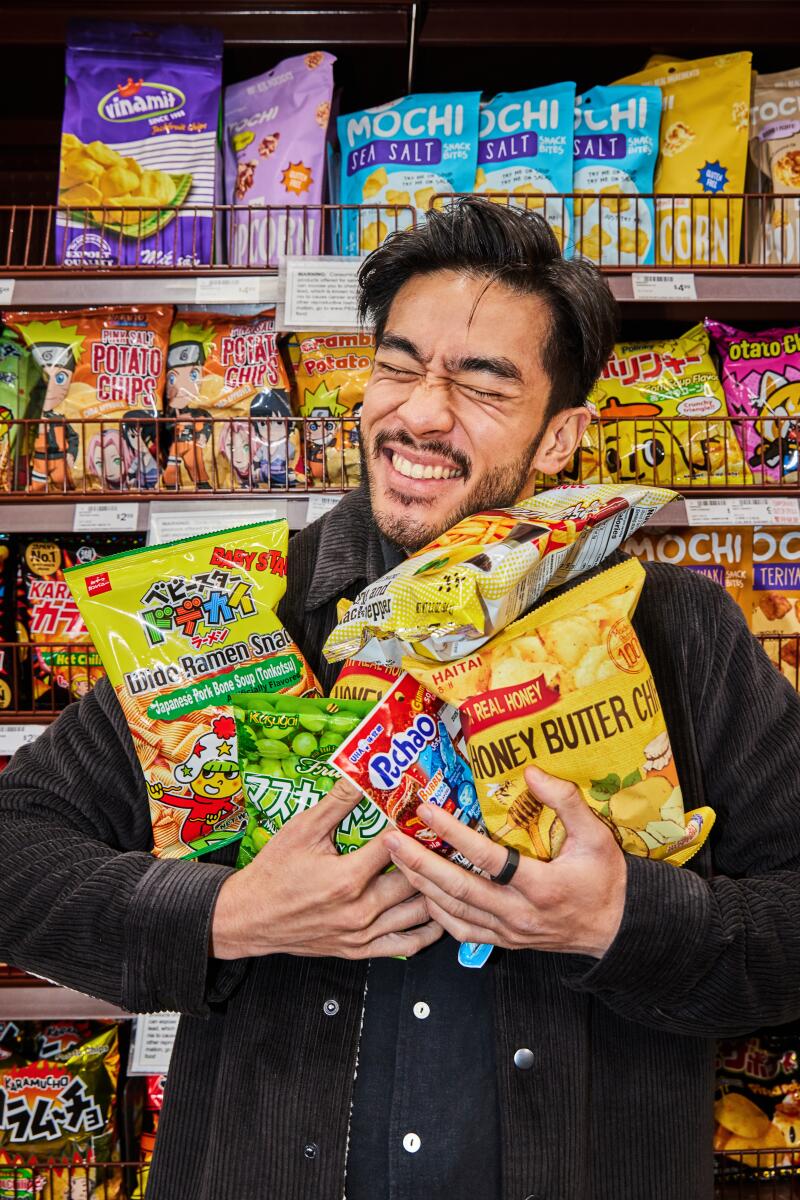
Some of Justin Chien’s favorite snacks: Calbee shrimp chips, honey butter chips and lychee jelly cups.
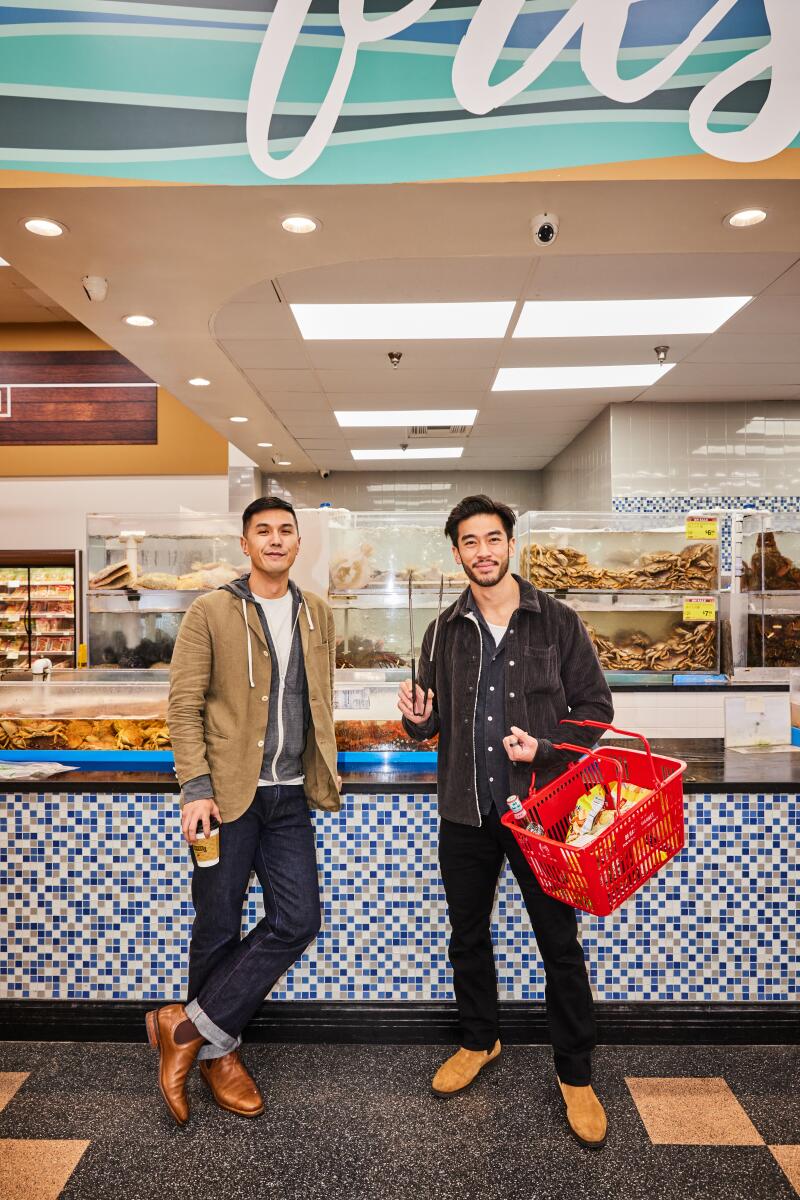
99 Ranch bags emblazoned with the logo make an appearance on the show.
If you’re looking for chips, drinks, sweets and other international snacks from around the world, this is the place to find them.
The snack with the most significance in the series is Buldak spicy chicken ramen. L.A. Deputy Dist. Atty. Alexis (Highdee Kuan), Charles Sun’s childhood friend on the show, eats bags of the uncooked instant ramen doused in the dry seasoning packets as a snack.
“Originally we had written it as Flamin’ Hot Cheetos, but we decided we wanted to do something a little more specific,” Wu says. “We thought it was just a badass thing to do, to be able to handle that much spice. And this one was so spicy, it killed me.”
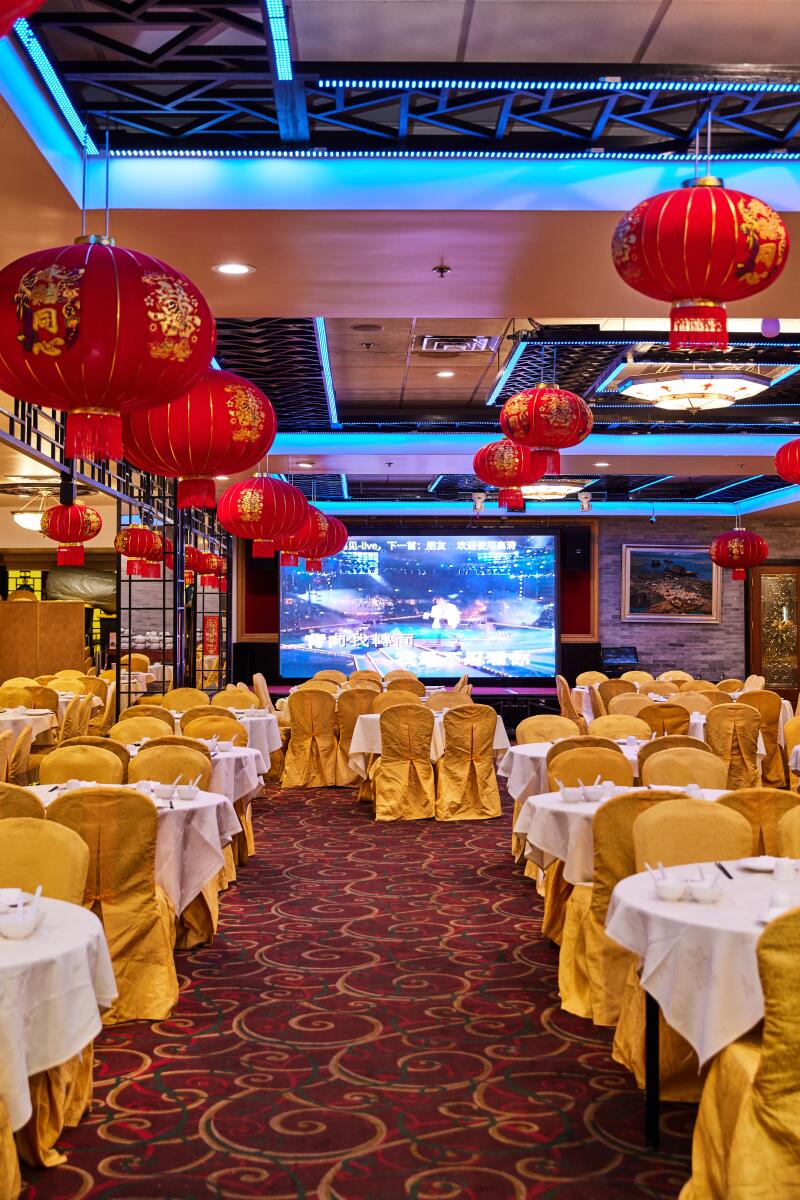
The dining room at Golden Soup.
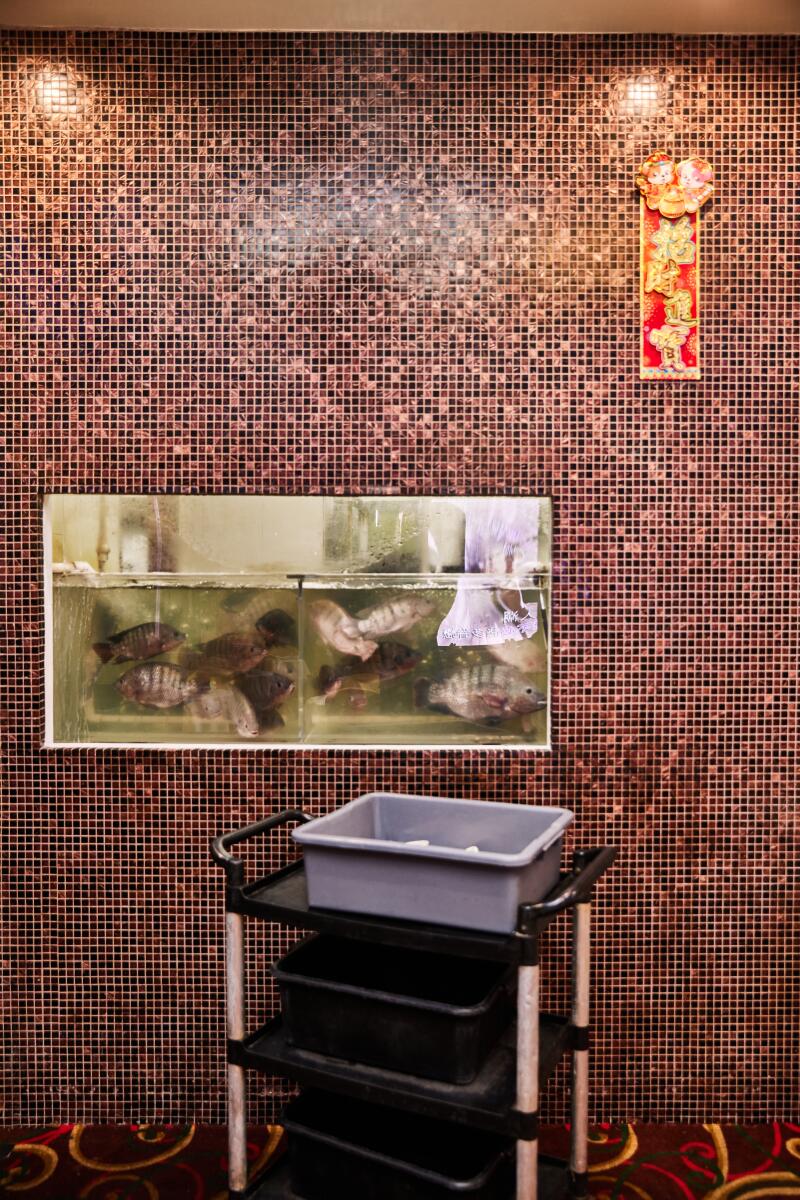
Fresh fish tank at Golden Soup.
4:03 p.m. Golden Soup
Wu and Chien sit down at a large round table in the dining room of Golden Soup, a banquet restaurant on the second floor of the Gold World plaza in San Gabriel.
“This is where we filmed our big dim sum fight,” Wu says.
He waves a hand around the grand room, pointing out the mirrored pillars, the walls lined with lavish glass panels and the large round tables covered in white cloths. This was the setting for one of the most impressive fight scenes in the series. It took a week to shoot and required dozens of stuntpeople, with fighting in the kitchen, the dining room, the parking garage and the hallway just outside the restaurant’s doors.
“It felt like such a big event that we wanted to take over a restaurant,” Wu says. “It just felt like a banquet was such an old Chinese, Taiwanese thing to do.”
Actor Manuel Garcia-Rulfo, star of Netflix’s ‘The Lincoln Lawyer,’ takes us on a taco crawl around downtown Los Angeles.
Though they say they’re still full from the hot pot, Wu and Chien order eggplant with garlic sauce, fried pork chops with salt and pepper, braised pork belly with preserved cabbage, sautéed spinach, beef chow fun and steamed pork with salty fish. The meal also comes with a pot of rice and a bowl of soup for the table.
The pork chops crunch when you take a bite, then ooze with an intoxicating mixture of juice and grease. The chow fun noodles are just al dente and slick with soy sauce and oil. The fat on the pork belly jiggles perfectly, nestled up against a mound of pickled mustard greens in a sweet and salty red sauce.
A hush falls over the table as everyone passes plates around the table and works on cleaning their pork chop bones.
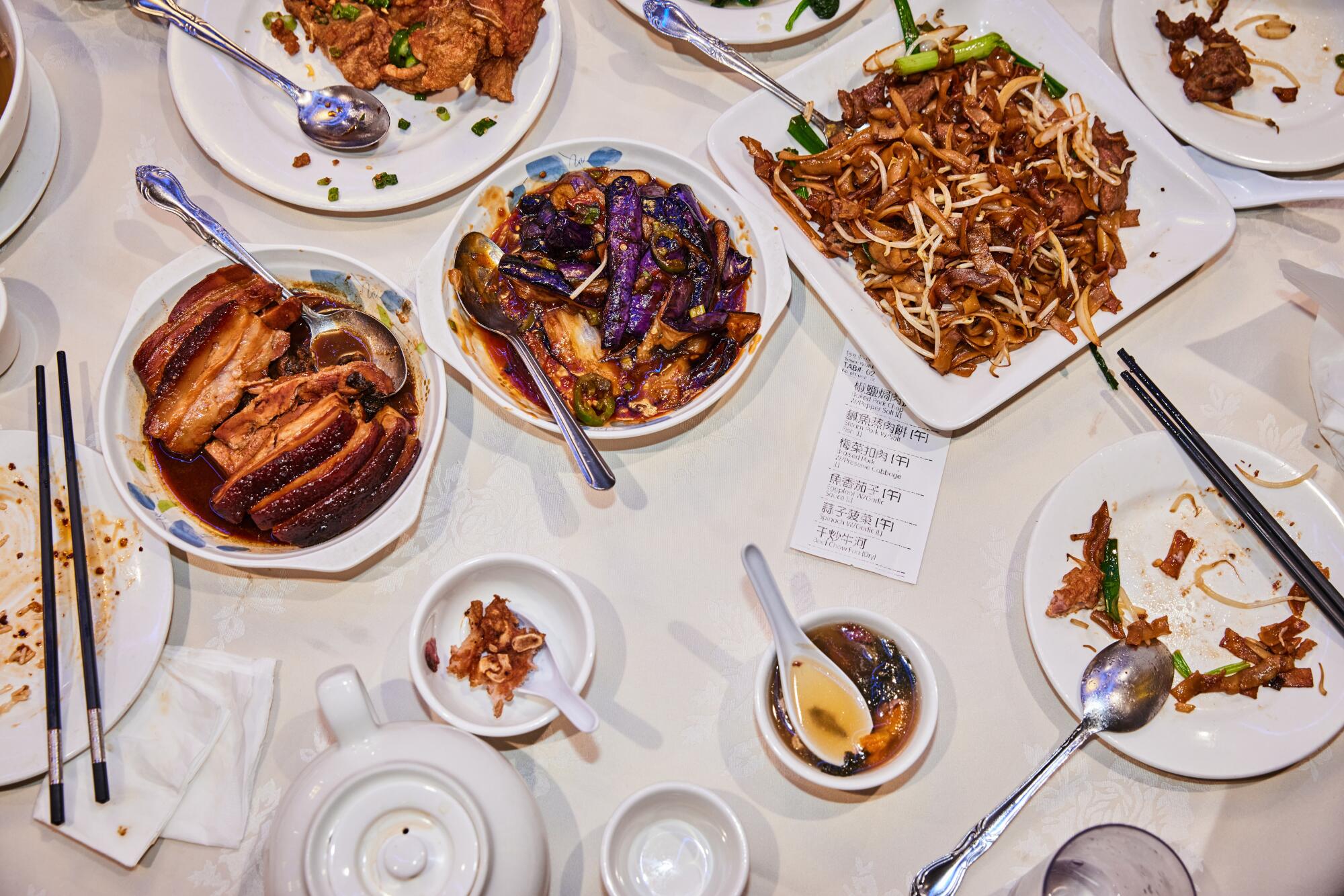
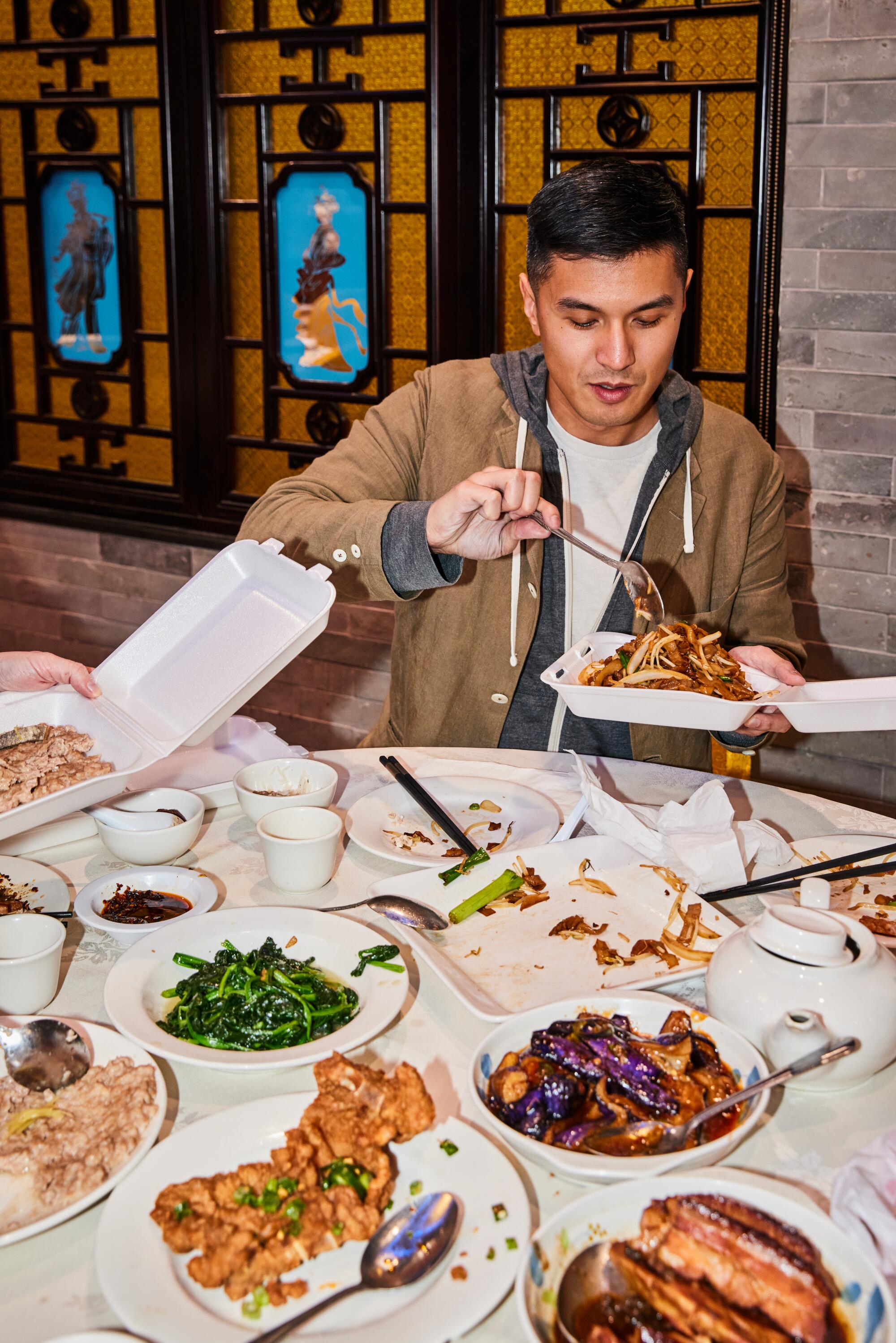
“I think we have a lot of dinner scenes around a table like this with a lazy Susan, and that’s how I grew up eating,” Chien says. “Food is big in every culture, but I think especially in Asian culture it’s important because it’s one of the rare moments of focused family time.”
“What’s amazing is I think we featured food the best we could on the show, but there’s still so many dishes and restaurants that we didn’t get a chance to use in the SGV,” Wu says. “I really encourage anyone who likes the show and likes to eat to come out and really do a full tour.”
Food is just one facet of a show that managed to accurately capture the Asian American experience in Los Angeles. Others include subtle nods to life in a typical Asian American home. In the middle of an intense fight scene, a character makes sure to remove his shoes, a common Asian practice when entering a home.
“We really wanted to make a show that in some ways reclaimed our childhoods,” Wu says. “We grew up watching so much American content and we didn’t feel like we were comfortable with whatever Asian American we were seeing. We wanted people to feel comfortable watching this, and feel celebrated in a lot of ways.”
As we boxed up our leftovers in what seemed like at least a dozen containers, I thought back to the multiple people who approached Chien throughout the day to ask for a photo and let him know that they loved the show. The series resonated with so many, including me. I’ll keep hoping Netflix reconsiders a second season.
Where to eat on a "Brothers Sun" crawl through the San Gabriel Valley
Xiaolongkan Hot Pot, 46 W. Valley Blvd., Alhambra, (626) 656-6969, xiaolongkanhotpottogo.com
Kee Wah Bakery, 729 W. Garvey Ave., Monterey Park, (626) 281-2680, keewahla.com
Street Churros, 500 N. Atlantic Blvd., #121, Monterey Park, (626) 872-1557, instagram.com/streetchurros.montereypark
99 Ranch Market, 140 W. Valley Blvd., #150, San Gabriel, (626) 307-8899, 99ranch.com
Golden Soup, 1039 E. Valley Blvd., Suite B201, San Gabriel, (626) 312-9586, instagram.com/golden_soup
More to Read
Eat your way across L.A.
Get our weekly Tasting Notes newsletter for reviews, news and more.
You may occasionally receive promotional content from the Los Angeles Times.
